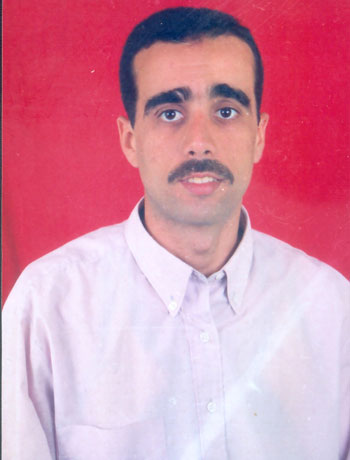
Ahmed Belbacha (Asharq Al-Awsat Photo)
London, Asharq Al-Awsat- The suicide of three detainees in Guantanamo Bay, Cuba last week reignited the debate about the future of more than 450 captives who have been imprisoned in the US base as “enemy combatants”, without trial, charges or any prospect of release.
One such prisoner is Ahmed Belbacha, one of 25 Algerian nationals in US custody, who lived in the United Kingdom between the years of 1999 and 2001. Documents obtained by Asharq al Awsat from Clive Stafford-Smith, legal director of Reprieve, a British prisoners’ charity who represents thirty-six detainees in Camp Delta reveal that Ahmad’s path from the costal British city to Guantanamo Bay, where he has been detained for the last three years, remains shrouded in mystery. It is believed he left for Pakistan to study in 2001 but no one knows how he ended up detained in Camp Delta.
“Ahmad sent a request via British residents Binyan Mohamed and Omar Deghayes, one of the youngest detainees in Guantanamo Bay, saying he wished to have
Stafford-Smith, legal director of Reprieve [a British prisoner’ charity Reprieve] to represent him.” A lawsuit was filed on Ahmad’s behalf but lawyers have yet to meet him. The US government continues to refuse to tell them what evidence it holds against Ahmad.
Born in Algiers , on 13 October 1969 , to a modest family, Ahmad had eight brothers and four sisters, two of whom are married. After completing his secondary school education, he undertook two years of military service and joined Sonatrach, an oil company. Between the years 1993 and 1997, Ahmad rose to prominence as a footballer in the Sonatrach team, the best in the country. He moved to the coastal city of Bournemouth in 1999 and worked at a laundry mat. His supervisor reported that while he spoke little English, Ahmad was always polite, hardworking and punctual.
The U.S lawyer is also representing Sami Muhieddin al Hajj, a Sudanese photographer of al Jazeera, Jamal al Banna, a Palestinian and the Iraqi Bishr al Rawi. Both men lived in London for several years before being detained in the Gambia in 2002.
Ahmad traveled to France by boat, after obtaining a visa, between February and March 1999. He then moved to Bournemouth where he enrolled in an English language course. He remained in contact with his family and regularly sent back money and clothes.
On 17 May 2001 , Ahmad was denied asylum but was given leave to remain. In June 2003, Ahmad’s final asylum appeal was denied but he was granted exceptional leave to remain. It is believed he was already in U.S custody at that point.
Eight detainees in Guantanamo Bay have lived in Britain for several years but never gained citizenship, like Ahmad. They include Jamal Abdullah, from Uganda, who moved to the United Kingdom in 1993 with his mother and the Saudi Shaker Abdul Rahim, who moved to the UK and married a British woman, with whom he has four children,
After not receiving any news about his whereabouts for two years Ahmad’s family feared he was dead Finally, in 2004, they received a letter from him through the Red Cross saying he was in Guantanamo Bay, Cuba.
